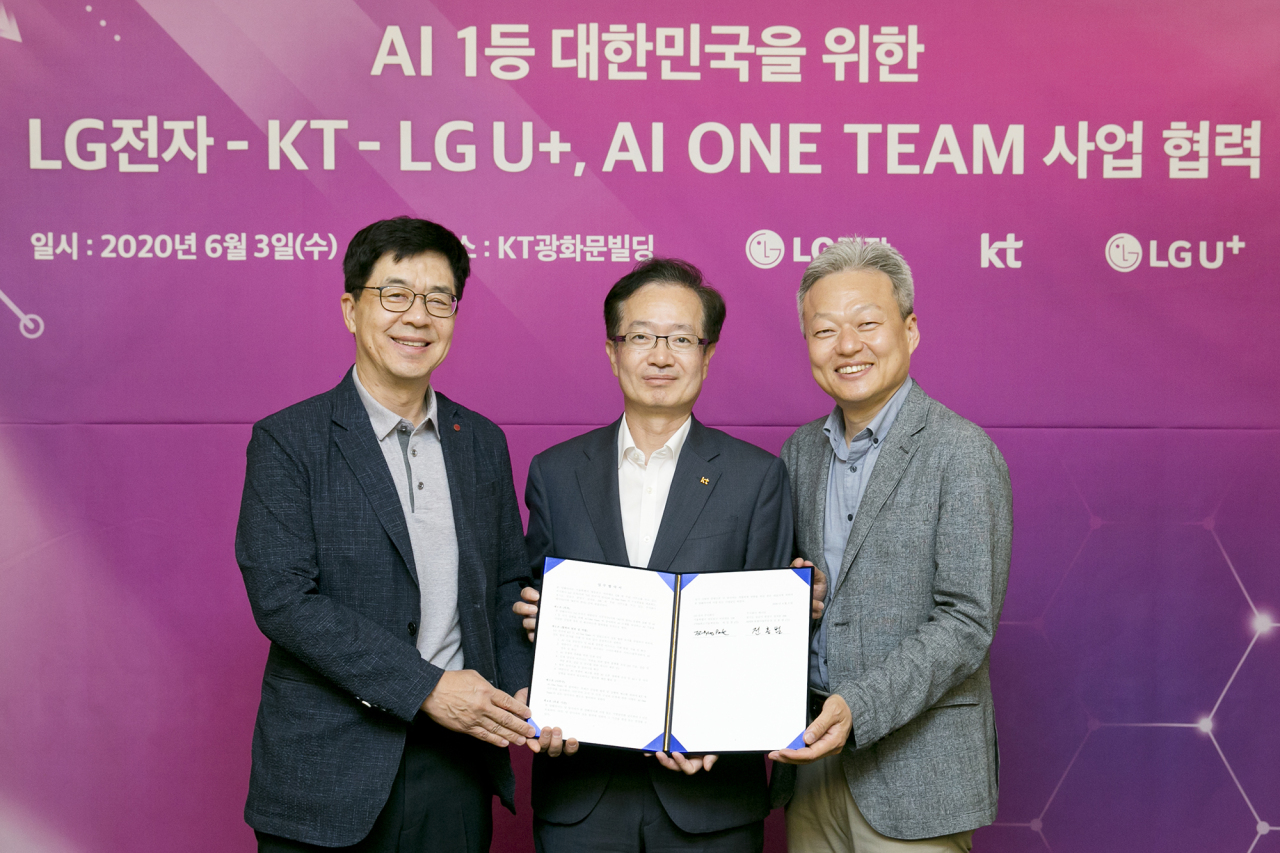South Korea’s tech companies are moving to create coalitions to reinforce artificial intelligence technologies under the government’s initiative to make the country an AI powerhouse, according to industry sources Wednesday.
Two competitive AI coalitions have been formed so far: One led by SK Telecom involving Samsung Electronics and Kakao, and the other by KT with LG Electronics and LG Uplus.
 |
From left, LG Electronics’ Chief Technology Officer Park Il-pyung, KT Vice President Jeon Hong-beom and LG Uplus’ future and convergence division chief Lee Sang-min gather for a signing ceremony held at KT’s headquarters in central Seoul, Wednesday. (KT) |
On Wednesday, KT, LG Electronics and LG Uplus announced they will make an open innovation platform called “AI One Team,” a strategic move seemingly against rivals SKT, Samsung and Kakao.
LG Electronics CTO Park Il-pyung, KT Vice President Jeon Hong-beom and LG Uplus’ Lee Sang-min, chief of LG Uplus’ future and convergence division, gathered for a signing ceremony and announced a united goal to take their AI technologies to a higher level.
The three companies have invited other entities to join the group, including Korea Advanced Institute of Technology, Hanyang University, Hyundai Heavy Industries Holdings and the Electronics and Telecommunications Research Institute of the ICT Ministry.
The members also plan to seek new business opportunities by exchanging AI technologies and compatible solutions.
While mobile carrier KT is expected to provide its nationwide 5G network and self-developed AI engines for key word spot, speech-to-text, text-to-speech, conversation, foreign language translation and customer consultation, LG Electronics will utilize the KT infrastructure and AI engines to develop new solutions applicable for a variety of consumer electronics.
The two could come up with ways to apply KT’s AI speaker GiGA Genie to LG’s ThinQ smart home appliance lineup that is currently joined by foreign AI giants like Google and Amazon.
The three firms added they will work together on an AI-powered solution that could help predict and counter pandemics like COVID-19 by using KT’s global pandemic prevention platform.
“This open innovation platform will allow local firms, research institutions and universities to cooperate in different fields, enhance the nation’s AI capabilities and create new business opportunities,” said LG Electronics CTO Park.

Meanwhile, the alliance proposed by SKT aims to maximize the involved companies’ current capabilities pivoting on their voice-activated AI speakers.
It was SKT CEO Park Jung-ho who had suggested inter-industry collaboration at the Consumer Electronics Show in January.
He had said SKT will work with Samsung and other outstanding tech companies to elevate Korea’s AI capabilities.
Although there has been no official announcement from Samsung, the SKT-led coalition seems to have embarked on some collaborative projects.
Since the three firms have established their own voice-activated AI speaker and related platform -- SKT with NUGU, Samsung with Bixby and Kakao with Hey Kakao -- the companies are expected to focus on making the three platforms compatible with each other.
For example, a possible collaboration will enable activation of Bixby, NUGU and Hey Kakao on SKT-made navigation app T Map or on Samsung’s home appliances.
As part of the upcoming cooperation, SKT and Kakao had tied-up through an equity exchange worth 300 billion won ($246 million) in October.
Samsung, however, declined to comment on the ongoing move.
The company has increased its research on AI since 2017 by establishing Samsung Research and seven AI centers in five countries. Its Bixby platform is expected to be added to all its products by the end of the year.
But Samsung’s Bixby has received lukewarm response from users with many complaining about inaccuracy in voice recognition and contextual understanding, due to the lack of data.
“The latest collaborative moves are seemingly led by the telecom sector,” said an industry insider. “The mobile carriers have invested a lot in developing various AI engines, while they are in need of expanding hardware and platforms that utilize their engines, so they need to work with manufacturers like Samsung and LG.”
“Companies like Samsung and LG, on the other hand, could take advantage of their mobile carrier partners in using their big data accumulated from network subscribers over a long time,” another industry official said.
By Song Su-hyun and Shim Woo-hyun (
song@heraldcorp.com)





![[Herald Interview] 'Trump will use tariffs as first line of defense for American manufacturing'](http://res.heraldm.com/phpwas/restmb_idxmake.php?idx=644&simg=/content/image/2024/11/26/20241126050017_0.jpg)

![[Health and care] Getting cancer young: Why cancer isn’t just an older person’s battle](http://res.heraldm.com/phpwas/restmb_idxmake.php?idx=644&simg=/content/image/2024/11/26/20241126050043_0.jpg)

![[Graphic News] International marriages on rise in Korea](http://res.heraldm.com/phpwas/restmb_idxmake.php?idx=644&simg=/content/image/2024/11/25/20241125050091_0.gif)